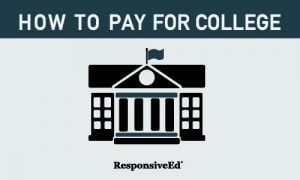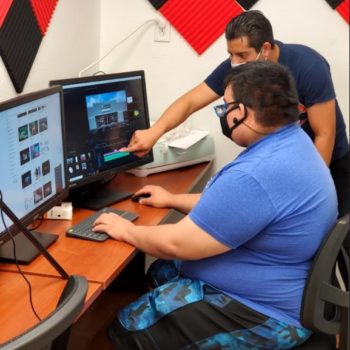Most students know college is expensive. They hear it from their friends and probably parents. Many students, just knowing that tuition payments require a mountain of money, decide college isn’t for them. But while that is true, ResponsiveEd’s Director of College Readiness Stephanie Scott suggests that there are some accessible ways to bring the costs down and minimize years of college debt.
Here are some of the questions she says you and your student should start discussing this fall.
Many students think college is beyond their means, is there a way that college can be more affordable for them?
The short answer is yes. There are many different ways to reduce the cost of college. It starts with a determination to educate yourself and then get to work. It will take some effort, but the resources are out there. If you aren’t yet a senior, start by taking dual credit and work study classes at school. You can also look into sports scholarships (try playing something unusual like golf), academic scholarships, loans, ROTC, and financial aid programs are all ways you can afford college. You need to start thinking early and put together a plan. There are many scholarships and grants available to help students, and it doesn’t cost you anything to apply. I always tell students they need to at least fill out the Free Application for Federal Student Aid (FAFSA). Aid is not based solely on how much your parents make. Take scholarships and applications seriously. Think of it this way, how many hours would you have to work to earn $5,000? You could get that amount in scholarship money. When it comes to the SAT, ACT and college applications, think of it as a job.
Here are some resources that can help you find scholarships and financial aid.
- Filling Out the FAFSA
- How Aid is Calculated
- Work-Study Jobs
- Basic Eligibility Criteria
- Deadlines
- Scholarships and Financial Aid
How do I look for Scholarships?
The US News and World Report had an article in which they listed five places to look for scholarships. Here are the five they listed:
- School
- Local library
- Community organizations
- Your employer
- Free online scholarship searches
The schools you apply to typically have academic scholarships based on SAT or ACT test scores and GPA. Your teachers may also have suggestions. Libraries are a wealth of information. Look for flyers, but also ask the librarian. Many organizations like the Boy Scouts and 4-H Clubs have scholarships. Be sure to start looking early because often you have to qualify. A lot of employers like CVS, McDonalds and Chick-Fil-A offer their employees scholarships. If you work for a company, ask about scholarships. Most importantly there are countless online scholarship research sites. They can list small scholarships and larger ones. Be strategic in how you apply and make sure you qualify, but don’t forget that multiple small scholarships add up.
Here are some great online scholarship searches
What are some common misconceptions about FAFSA?
It is quite common for students and parents to assume they won’t qualify for financial aid because of their parent’s income. There is actually no cut-off based on income and there are many factors besides income taken into account. Your grades, ethnicity and ages are not taken into account in FAFSA. Often students think they may be automatically disqualified because of those factors, but they don’t play any role in determining how much aid you receive.
What are the new changes for the 2017-18 FAFSA?
FAFSA has changed in some important ways. Students can now file a 2017-18 FAFSA in October rather than waiting until January. Students can also use earlier income information. For students applying for the 2017-18 school year this means you will submit the 2017-18 FAFSA from Oct. 1, 2016-June 30, 2018 using the income and tax information from 2015.
Can I be successful if I don’t start at four-year university?
The answer is yes. Hundreds of thousands of students start at local community colleges to get their requirements out of the way and to keep costs down. There is nothing wrong with this approach as long as you stay focused and have a plan for where you want to complete your bachelor’s degree. Credit transfer is always important to consider. There is more than one way to prepare yourself for the future, so think through what you might like to do after finishing your education and then plan backwards to create the right road-map to success.




